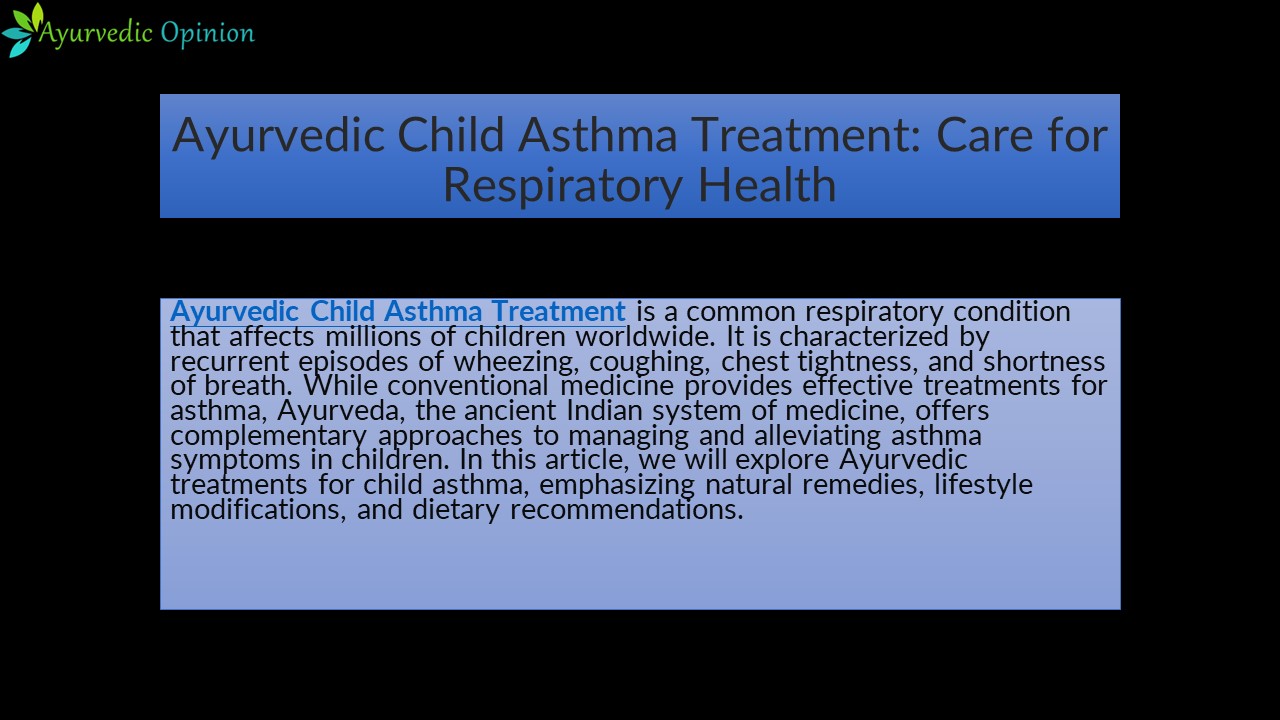Ayurvedic Child Asthma Treatment PowerPoint PPT Presentation
Title: Ayurvedic Child Asthma Treatment
1
Ayurvedic Child Asthma Treatment Care for
Respiratory Health
- Ayurvedic Child Asthma Treatment is a common
respiratory condition that affects millions of
children worldwide. It is characterized by
recurrent episodes of wheezing, coughing, chest
tightness, and shortness of breath. While
conventional medicine provides effective
treatments for asthma, Ayurveda, the ancient
Indian system of medicine, offers complementary
approaches to managing and alleviating asthma
symptoms in children. In this article, we will
explore Ayurvedic treatments for child asthma,
emphasizing natural remedies, lifestyle
modifications, and dietary recommendations.
2
Understanding Child Asthma from an Ayurvedic
Perspective
- In Ayurveda, childhood asthma is often related to
an imbalance in the Vata dosha, which governs air
and movement in the body. This doshic imbalance
can lead to respiratory issues, such as asthma.
Ayurvedic practitioners aim to balance the doshas
and strengthen the childs respiratory system to
manage and prevent asthma attacks.
3
Ayurvedic Treatment Approaches
- Herbal Remedies
- Vasaka (Adhatoda vasica) Vasaka is a well-known
Ayurvedic herb for respiratory health. It
contains compounds that help reduce inflammation
in the airways, clear mucus, and ease breathing
difficulties. Vasaka can be administered in the
form of syrup or herbal decoction. - Tulsi (Ocimum sanctum) Tulsi, or holy basil, has
strong anti-inflammatory and immune-boosting
properties. It can help reduce asthma symptoms
and enhance lung function. Tulsi leaves or a
specially prepared Tulsi syrup can be given to
the child. - Licorice (Glycyrrhiza glabra) Licorice is known
for its natural anti-inflammatory and soothing
properties for the respiratory tract. It can be
consumed as a tea or included in herbal
formulations prescribed by an Ayurvedic
practitioner. - Sitopaladi Churna Sitopaladi Churna is an
Ayurvedic powder made from ingredients like
Sitopala (sugar candy) and Pippali (long pepper).
It helps relieve cough, congestion, and breathing
difficulties.
4
- 2. Breathing Exercises and Yoga
- Ayurveda recommends incorporating breathing
exercises and yoga postures into the childs
daily routine. These practices can help
strengthen respiratory muscles, improve lung
capacity, and reduce asthma symptoms. Practices
like Anulom Vilom (alternate nostril breathing)
and Bhramari (bee breath) are particularly
beneficial. - Dietary Guidelines
- Ayurvedic dietary recommendations for child
asthma include - Avoiding cold, heavy, and mucus-producing foods,
such as dairy products, processed foods, and
fried foods. - Emphasizing warm, nourishing foods like soups,
stews, and cooked vegetables. - Encouraging the consumption of honey, which has
natural anti-inflammatory properties. However,
honey should not be given to children under one
year old due to the risk of botulism. - Reducing the intake of allergenic foods, such as
gluten and certain nuts, if allergies contribute
to asthma.
5
Customized Treatment Plans
- Ayurvedic treatment for child asthma is highly
individualized. An Ayurvedic practitioner will
assess the childs unique constitution (Prakriti)
and dosha imbalances (Vikriti) to create a
personalized treatment plan that addresses their
specific needs and circumstances. - Ayurvedic treatment for PCOD offers a holistic
and natural approach to managing this complex
hormonal disorder. By addressing the root causes,
rebalancing the doshas, and promoting overall
well-being through herbal remedies, Panchakarma
therapy, dietary changes, and lifestyle
modifications, Ayurveda can help women with PCOD
regain hormonal balance, alleviate symptoms, and
improve their quality of life.
6
Conclusion
- Ayurvedic treatment for child asthma offers a
holistic and natural approach to managing this
respiratory condition. By addressing doshic
imbalances, strengthening the respiratory system,
and providing relief from symptoms through herbal
remedies, dietary modifications, yoga, and
lifestyle adjustments, Ayurveda can complement
conventional asthma management in children.
However, its crucial to consult with a qualified
Ayurvedic practitioner for a customized treatment
plan that takes into account the childs
individual constitution and health needs.
Ayurvedas focus on holistic care and natural
healing makes it a valuable addition to the
management of childhood asthma, improving the
childs quality of life and respiratory health.

